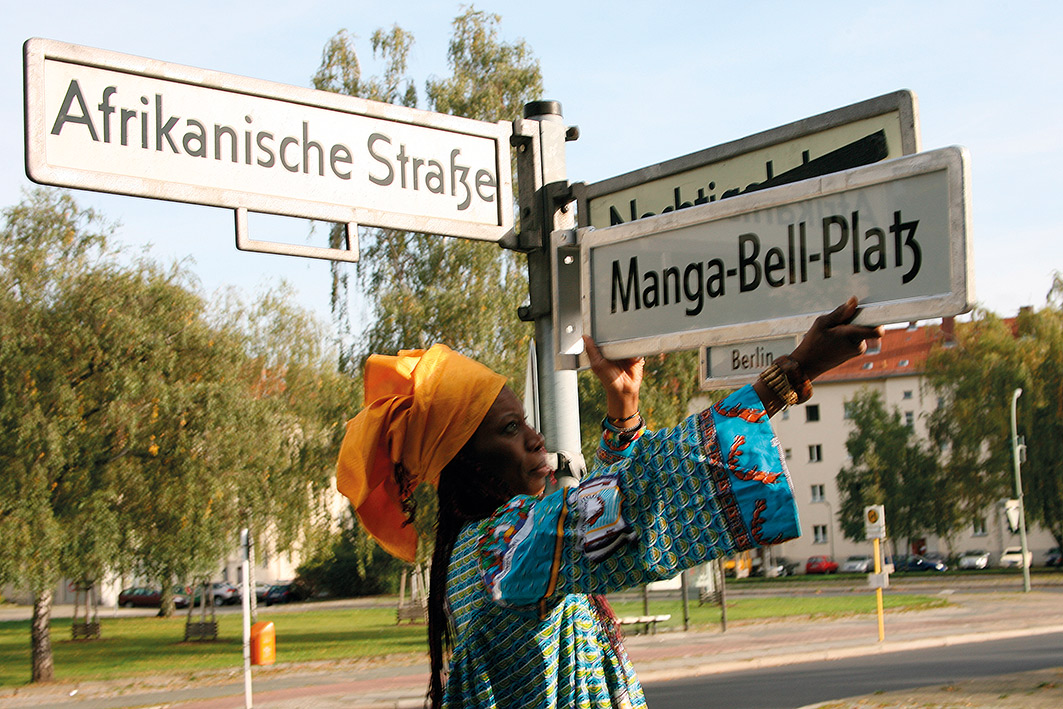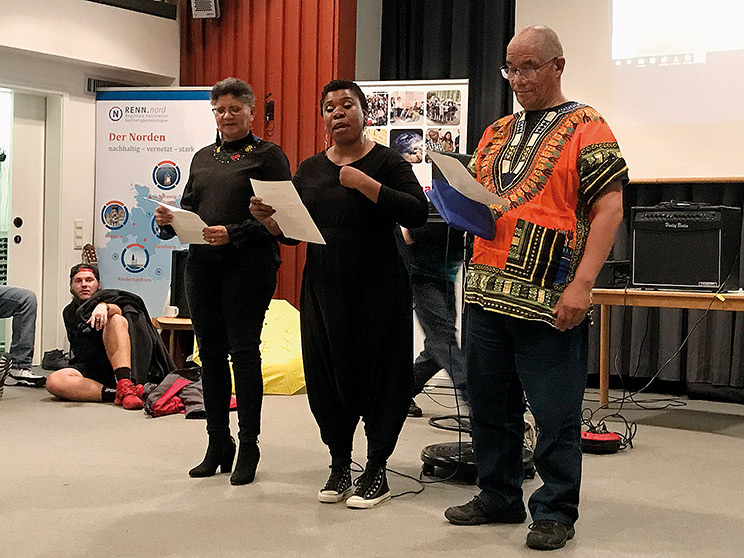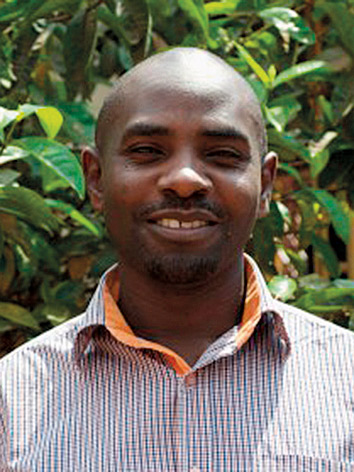1.1 A utopian vision in the shadow of colonialism
By Timo Holthoff
Which historical
structures continue to
shape our world today?
As a result of the enslavement, Christianisation and colonisation of large parts of the world carried out by European states, we are confronted with a history of oppression, exploitation and annihilation of entire societies. In doing so, Europe primarily pursued power politics and economic interests, accompanied, however, by attempts to morally legitimise this domination of the rest of the world by means of the racist myth of white supremacy. In accordance with this ideology, the societal structures, beliefs, economic practices and know-how of colonised peoples were devalued and systematically destroyed, even to the point of depriving them of their humanity. European views of the world and human nature were violently imposed on them. And all this happened not so long ago: the age of colonialism only came to an end about 50 years ago.

The Global South and the Global North are not (merely) geographical terms, but political concepts. The Global North is comprised of countries and people whose structural privilege and power are the result of deeply rooted systems of global inequality. The Global South consists of countries and people that have been structurally discriminated against and marginalised by this system. Accordingly, Australia as a country and national economy, forms part of the Global North, for instance, but Australia‘s Aborigines belong to the Global South. These terms are helpful constructs for designating structural differences without using the phrase “developing countries“, which has pejorative connotations and depoliticises global inequality.

The legacy of colonialism: global inequality is no coincidence
The effects of this history can be felt on many levels. To a large extent, today‘s global inequality is based on the system of exploitation established during colonial times, especially the global division of labour, in which resources are extracted cheaply in the Global South and then processed at great profit in the North. The history of colonialism is thus by no means a thing of the past: through unjust economic and trade structures, Europe continues to boost its prosperity at the expense of countries and people in other parts of the world. As such, all of us, in both the Global North and the Global South, are closely linked together as individuals: for example, through low prices for goods – such as chocolate or clothing – in the Global North and low wages, poor working conditions and ecological consequences in the Global South. So-called “development aid“ by no means compensates for this imbalance. On the contrary, the promise of public “development funds“ is often tied to economic policy conditions, such as the opening of markets to European products, which perpetuate imbalances and dependencies. Consequently, inequality is neither a matter of destiny or chance, but rather a result of historically entrenched power relations. Poverty is intertwined with wealth.
Cultural traces of colonialism affecting the South and the North
Yet the painful legacy of colonialism extends beyond global economic structures. Former colonial societies are still struggling to heal the wounds of this historical trauma. Their national borders, political and educational systems as well as their official languages are in many respects European imports and thus perpetuate the problems of foreign rule. Many sectors of society were never in effect decolonised – or continue to be colonised by the economic and cultural hegemony of the North, for example in the context of development cooperation. In some states (especially in Latin America), descendants of European settlers still enjoy economic and political supremacy, while indigenous populations still struggle to gain their independence and freedom..
However, colonialism has also left its cultural mark in Europe: The belief in the superiority of or lack of alternatives to the European economic and social model, which has been critically termed Eurocentrism, still dominates the thinking of most people in Europe, at least unconsciously. This is usually associated with an attitude that dismisses alternative models in the Global South as backward and flawed. Even if colonialism is now widely recognised as a historical crime, the idea still persists that the South must “develop“ along the lines of the North – for which it needs the “help“ of well-meaning Europeans. Whether well-intentioned or not, this condescending view of the world, which is based on the provision of assistance and the associated images of self and other, perpetuate the racist ideology of colonialism: a necessary „civilising of the backward“, following the European path of development. These patterns of thought, stereotypes and prejudices permeate the political discussions and media coverage of poor countries and refugees, the fundraising activities of aid organisations and even parts of academic discourse. In more subtle ways, they can also be found in everyday educational contexts – for example in children‘s songs, carnival costumes, school books or school aid projects.
These patterns are learned and reproduced in equal measure, largely independent of educational backgrounds and political convictions. A cosmopolitan mindset, which probably underlies all global partnerships in education, therefore does not immunise people against racist colonial attitudes and behaviour. As difficult as it may be to accept, they are part of a 500-year old cultural legacy that has so far hardly been processed. Europe also needs to decolonise itself, both mentally and emotionally, and with regards to the role it plays in the world. This necessary learning process is not a matter of individual guilt, but of collective responsibility.

However, this should not cause us to reject educational partnerships as a whole – on the contrary, given that they harbour the potential to change people and the world in a positive way. Instead, we should be asking ourselves how these partnerships come about and examine their goals, their content and their quality: How can the above-mentioned challenges be dealt with collectively in order to get closer to the vision of equal cooperation for a just world? How can the full learning potential of education partnerships be unlocked for all participants?
Timo Holthoff
Trainer and facilitator for transformative and decolonised education, Germany
Education in a post-colonial context
Educational projects and partnerships between countries of the Global South and North continue to be shaped by colonial dynamics, given that the historically entrenched structures of inequality also manifest themselves in this field. This is easily apparent, for example, whenever European project participants have no trouble travelling to partner countries while European visas are extremely difficult to obtain. At the same time, the financial resources for such partnerships mostly come from the Global North. European partners (or their sponsors) thus often unilaterally determine the framework for educational partnerships and thereby take on a dominant role. Especially where this is combined with donation activities for projects in the South, a dynamic of givers and takers quickly develops, which creates dependencies and reproduces stereotypical relations and images. This makes it difficult to foster a culture of honest feedback and mutual learning on an equal footing.

How to decolonise education within international educational partnerships
Decolonising education means that a country becomes independent in its acquisition of knowledge, skills, values, beliefs and habits. Decolonising education within international education partnerships would mean deploying the respective partners and platforms to transform such colonial education systems into independent curricula.
For international partnerships to play a role in the decolonisation of education, they need to be based on RESPECT for and ACCEPTANCE of differences and diversity. The common ground should be the promotion of human rights and the protection of our planet. Nevertheless, the ways to achieve them should not be forced to be the same worldwide. One of the main tasks for international partnerships is therefore to join up with local partners and to support them in defining their own education systems.
Decolonising education means that a country becomes independent in its acquisition of knowledge, skills, values, beliefs and habits. Decolonising education within international education partnerships would mean deploying the respective partners and platforms to transform such colonial education systems into independent curricula.
Geofrey Nsubuga, National coordinator of Somero Uganda